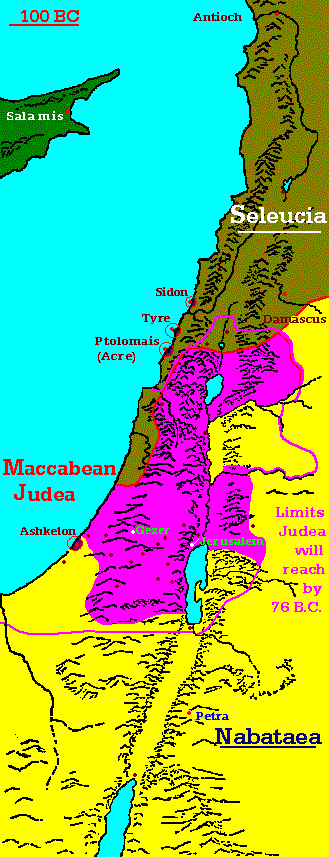Prepare Ye the Way
100 - 1 BC, the Holy Land
100 - 1 BC, the Holy Land
 Warfare was the cosuming passion of Alexander Jannaeus of Judea, and it had to be paid for by his subjects.
The price for the fleeting vision of empire was high and he had constant civil war within his domain.
The priestly monarchy and the aristocratic Sadducees had forsaken the masses fo the people, who found more comfort and leadership in the Pharisees and teachers.
Alexander Jannaeus' widow Salome Alexandra ruled Judea through a few final years of grace until 67 BC, but civil war broke out between her sons Aristobulus and Hyrcanus.
Warfare was the cosuming passion of Alexander Jannaeus of Judea, and it had to be paid for by his subjects.
The price for the fleeting vision of empire was high and he had constant civil war within his domain.
The priestly monarchy and the aristocratic Sadducees had forsaken the masses fo the people, who found more comfort and leadership in the Pharisees and teachers.
Alexander Jannaeus' widow Salome Alexandra ruled Judea through a few final years of grace until 67 BC, but civil war broke out between her sons Aristobulus and Hyrcanus.
Hyrcanus, who held office as high priest, appealed to Antipater, Governor of Idumaea, for aid, and also to the Roman general Pompey. Rome, as usual, was glad to be of assistance. Pompey took Jerusalem from Aristobulus in 64 BC. Hyrcanus was confirmed as high priest, but Antipater now held the real power in the land, becoming Procurator of the Jewish territories. The days of independence were over.
Confusion followed Caesar's assassination. Antipater was murdered. Parthia held Judea for a time, carrying away Hyrcanus and settingup a puppet king; Antipater's son Herod fled to Rome. He soon returned to claim the throne as a Roman vassal, and in 37 BC, the reign of Herod the Great began.
He was a brutal and erratic king. His grand building projects were paid for by an oppressed populace, and all indications of rebellion were bloodily suppressed. New cities. New cities of Hellenistic design arose, including Caesarea on the coast. A fine temple was built in Samaria over the ruins of Jezebel's palace.
Most of this development was for the glory of Herod and his Roman masters. He restored Jerusalem (in Greek style) and rebuilt and expanded the Temple (glorifying it with a Roman eagle, which further embittered the populace). His excesses were tolerated by the Romans, but when he died in 4 BC, Augustus quietly divided most of the troublesome province into three tetrarchs or principalities under Herod's sons.
Posted by John  Read more
Read more  Comments (15)
Comments (15) ![]() 17.01.
17.01.